World Family Summit 2017
GPI – Global Prenatal Initiative will be participating this year at the World Family Summit 2017 which will take place at the UN in Geneva, 14th&15th December, with Youth representative Ioana Frandes.
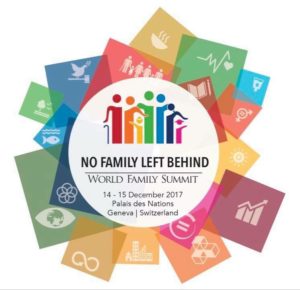
GPI – Global Prenatal Initiative will be participating this year at the World Family Summit 2017 which will take place at the UN in Geneva, 14th&15th December, with Youth representative Ioana Frandes.


Precious moments spent in the womb represent the foundations for long-term health, emotional security, brain construction, creativity and even behavioral characteristics for every human being.
During pregnancy, it goes hand in hand with what a mother is experiencing and after delivery. We can hardly turn the clock back. Today, it is largely proved by scientific studies that it no longer has to do with any faith-based theses.
Discovering that mother’s emotions can directly influence a baby’s development in the womb is a turning point in the adoption of a new paradigm : the archaic vision of pregnancy in which the baby was just « a thing » unable to have his own feelings, is clearly behind us.
Such a vision is fully refuted by Dr. Barbara Findeisen, a psychotherapist with over 28 years of experience, in her book Womb Prints : « The psychology of the womb and birth is such a neglected subject ». She has been closely working with Dr. Burce Lipton, Ph.D., who is internationally recognized as a pioneer in New Biology. He is the main author of The Biology of Belief. He received the 2009 prestigious « Goi Peace Award » (Japan) in honour of his scientific contribution to global peace by freeing humanity from the fatalistic dogma of genetic determinism, bringing knowledge that is empowering us on the path of our self-determination. In Nature, Nurture and the Power of Love, his research has led to the fact that environmental signals are responsible for selecting the genes produced by the fœtus. Our DNA is no longer seen as rigid, but as flexible and constantly modified by nurture and how we perceive it, by giving shape to our body and our psychological attitude. Given that our perception has the final say as regards physical ressources, it is no doubt our responsibility to choose our filters of reality to regenerate ourselves so that we have a direct impact on our « genetic data base ». Thus, our fate is no longer determined by our genetic heritage and if we keep this as a postulate, to get to the bottom of things, it leads us to the concept of Maternal Empowerment : Mothers are able to build a better world !

Scientific studies show a fetus receives chemical signals from its mother that could have a negative impact on how a baby develops after birth.
Therefore would it not be wise to start feeling at peace with oneself before deciding to have a baby? It can become a way of life, a way of being. Moreover it would be easier to keep experiencing peace during pregnancy. Simple things should be done during pregnancy to stimulate your own secretion of hormones such as endorphins (well-being hormones) and oxytocin (the love hormone). For example, talking to your baby while in a state free of stress, would permit the releasing of these two chemical signals which are shared with the fetus through the umbilical cord. On the one hand, it is believed that these two hormones are crucial for development of the fetus, but on the other hand, stress hormones may play a terrific role. One of the hormones our brain releases when we are under the influence of stress is adrenaline. It can be highly useful in an emergency situation in which our survival instinct is needed but in everyday life it may be responsable for the increase of blood sugar levels, artery pressure, breathing rate, blood flow to skeletal muscles and heart rate. Moreover these hormones are addictive and both the body and mind become used to secreting one group more than the other. Our whole vision of life might be determined by this habit our mother gives us while in her womb. If a universal rule could then be found, it would sound like « the more you stay positive, the more you will prepare your baby to be so as well ! »

Global Prenatal Initiative
The GPI, known as the Global Prenatal Initiative, is a citizens organisation from the UK which has decided to gather and share scientific knowledge on prenatal issues and which has organized events all around the world. Its main aims are simple :
• To raise awareness in all sectors of society on the long-term impact of the 9 months of pregnancy thereby attaining individual and global peace, sustainable development and poverty eradication.
• To emphasize the impact of parenting, and especially the key role of the mother during pregnancy and birth, for the future of humanity.
• To advocate putting Prenatal Education at the heart of all education, health, social development and policy making. This is about to be done in the UK through the legislative validation process of the 1001 critical days Manifesto and in China where senior authorities are searching for new programmes to better anticipate pregnancy.
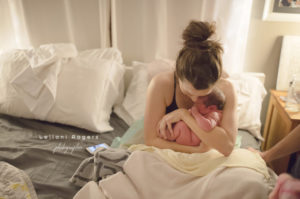 Seen as a good alternative The Royal College of Midwives (RCM) in the UK, support home birth for women who have uncomplicated pregnancies.
Seen as a good alternative The Royal College of Midwives (RCM) in the UK, support home birth for women who have uncomplicated pregnancies.
Women may choose home birth because they prefer the intimacy of a home and family or desire to avoid an over-medically centered experience, which hospitals offer. There is no reason why home birth should not be offered to women at low risk of complications and it may confer considerable benefits for them and their families. It is common sense in Northern European Countries such as the Netherlands, where the rate of home birth is one of the highest in the Western World. Some 30 percent of Dutch women deliver at home while around 60 percent do so in hospital, mostly for medical reasons, and another 10 percent deliver in special out-patient birthing clinics. In other European countries such as Germany, France, Britain, Belgium and the Scandinavian countries home deliveries account for no more than two percent. Thanks to the empowerment of midwives and doulas, it is far from being difficult to give birth at home, compared to France, where midwives have no insurance if anything should happen during labour. Should something go wrong during labour, a midwife in France would find him or herself solely responsable and would face a prison term or pay a considerable sum of money. Thus a pregnant woman is left with one option : deliver her baby at hospital in the emergency service, where she would be « warmly welcomed ». Can you imagine the beautiful cocktail of stress hormones and then pain ? However, in those countries in which midwives are appreciated for their wonderful work, families enjoy follow-up from the beginning, even before birth, up to delivery, and midwives or doulas work with the woman to win her trust in order that she should feel comfortable and safe on d-day, thanks to exercices aimed at warding off stress and suffering. Training in hypo-birthing, sophrology or yoga is highly useful to control your body pain and give birth in a natural way without epidural anesthesia.
There are other options for your pregnancy : Birth centers are good alternatives to hospitals as you are able to stay there, with your relatives, from one to nine months. These are places in which staff cares about you and your family by offering you the best conditions through workshops, training and artistic activities.
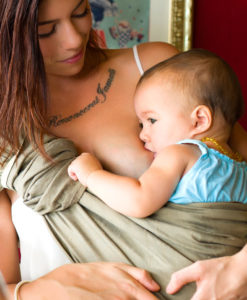 A crucial thing on a mother to-do-list is definitely to breastfeed her baby.
A crucial thing on a mother to-do-list is definitely to breastfeed her baby.
In 2012, UNICEF announced that the increasing of breastfeeding rates in the UK could save the NHS money through improving health outcomes.
Thanks to the Infant Feeding Survey, done every five years and published by the NHS Information Centre, figures show that there were real improvements from 2005 to 2010. The proportion of breastfedbabies at birth rose by 5%, from 76% to 81%. The initial breastfeeding rate in 2010 was the highest in England at 83%, compared with Scotland, Wales, and Northern Ireland. Breastfed-babies are less likely to be subject to gastroenteritis, respiratory infections, sudden infant death syndrome, obesity, type 1 and 2 diabetes and allergies such as asthma or lactose intolerance. Its entire immune system is stimulated by the four types of breast milk at different stages of his development. Breast milk is constantly changing to satisfy a baby’s need. The first type is colostrum, followed by transitional milk, then foremilk and finally hindmilk. There are numerous benefits in breastfeeding for mothers as well. The longer a mother breastfeeds, the greater she will be protected against breast or ovarian cancer, and hip fractures in later life. The UNICEF report showed that for only five illnesses, moderate increases in breastfeeding would translate into cost savings for the NHS of £40 million and tens of thousands of fewer hospital admissions and consultations.
In conclusion, thanks to this research, we can no longer afford to ignore the deep implications of our behavior on our baby’s development. Finding time to truly work with your body and your mind during pregnancy, by transmitting positive energy to your baby is synonymous with acting as a responsible citizen. Let us do our best to build a better world together!
Author: Marie Cier
Editor: Ioana Frandes
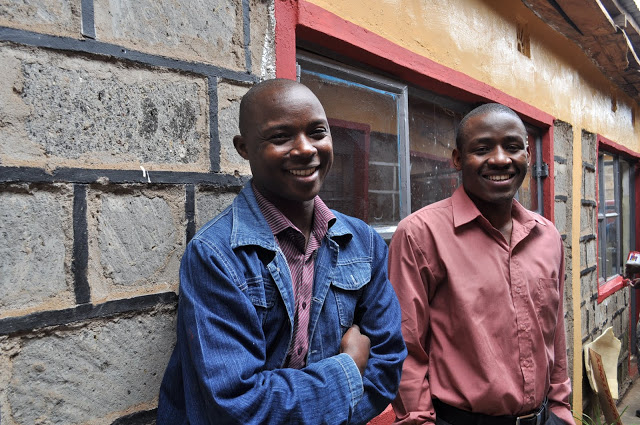
Fred and Moffat (Fre-Mo)
Today’s Youth is tomorrow’s parent. His role is critical in overcoming the obstacles on the path to better maternal care. The world should have faith in it and so should be the organizations that are part of women’s pregnancy journey. The youth has the goodwill, the opportunity and the critical roles to play. I have been there and I know it’s a challenge, but with energy, passion and a spirit of adventure big things are on the way.
Empowerment to an expectant woman is to lighten a dark alley in the journey by pulling down the fears, countering unnecessary complications, creating understanding between caregivers and families and the need for the expectant woman to learn to listen and keep her pregnancy safe by all means at will.
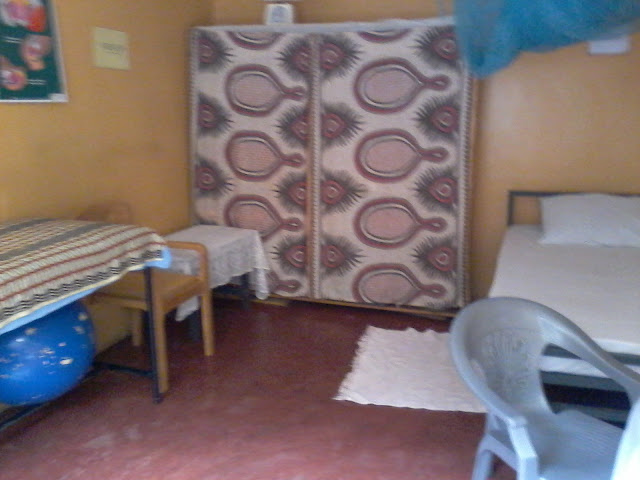
FreMo Birthroom
At our birth centre here in the slum of Kawangware the challenges faced with these women and their families are myriad woven with social, economic and cultural system dysfunctional yet most of them have been overcome by a culture in service delivery packaged and practice adhering to the woman’s needs; the midwifery model of care that works magical and befits well to every low-risk pregnant woman.
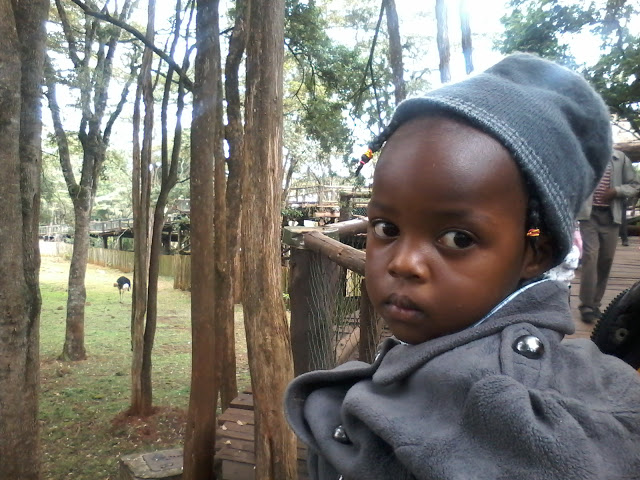
Irvinta
I married in my mid-twenties and my son came two years later. We had already opened our Medical and Birth center to care for local pregnant women. The culture was not the one we pride with but with the gracious Midwife Vicki Chan, incorporating the safety, compassion, support and dignified care during birth all changed. Unfortunately, my son will be born in a public facility where my wife endured a lot of loneliness and anxiety that came following. I love my son dearly, but I understand well his birth-care was not the beautifying one. Two years later my daughter was born. She is a princess who was welcomed into this world by loving, compassionate and dignified care. Irvinta now 3 years old was born at home with my wife Judith, Son Frank, Midwife, Doctor and I, a choice we took because it was a low-risk pregnancy. The birth was simple, easy and sacred so to say but little. This care received by my daughter perhaps is the greatest gift any caregiver; parent or community would ever adorn their babies. The journey was walked with love, care and support. All fears buried, love was in the air to empower the whole care. I reaped what I had sown by caring women with the standard basic care that is full of safety, compassion and social justice. Many of the families we serve have had the privilege and opportunity to experience the same. As a youth, I stood for what is right and I earned a place in my daughter’s life by giving her the care she needed and deserved. If all the youths are brought aboard to identify how critical their involvement in prenatal and birth, we will all see the beauty of the world that God foresaw after creation. It was all beautiful. The youths will make the difference and our life will be beautiful.
Today, I’d like to share a story with you.
Well, this is precisely what the story I want to tell you is about:
Many years ago, in 1952, Hélène, a young French woman fell in love with a man from the neighbourhood. Born in a very catholic family, she knew that marriage was serious business. Her parents had very strict ideas on this matter. She also had a loving, yet rather conflictual relationship with her mother who, by the way, was very clear on the fact that her daughter’s beloved didn’t match the social level expected from a potential son in law. There also was an obvious untold rule stating that no man would ever touch this young beauty out of the holy sacrament of marriage…
Well, life had another plan… One day Hélène had yet another passionate fight with her mother. She left the house crying and went to her beloved for consolation, which he provided with all the love he could give. The outcome fell like a bomb on the whole household: A young and pure single catholic student had just got pregnant in the middle of her studies and the father was not considered an acceptable match.
All hell got loose… shame had landed on a proud and “respectable” family. The sinner would never become the brilliant graduate her parents had wanted. Instead, she had to get married in emergency and disappear for a while, far from the eyes of the dreaded public opinion.
The least I could say is that her pregnancy was far from blissful or even peaceful.
The baby was born premature, long before the acceptable 9 months after the wedding. He was quickly sent to his father’s mother so that an appropriate birth date could be announced to the family and friends!
Decades later, a sixty years old baby boomer accustomed to monitoring his emotional state was experiencing once again a very unpleasant feeling which had never really left him since early childhood. Someone close to him had just triggered the dreaded sense of low self esteem and rejection he knew so well and for so long. Years of personal development had allowed him to go through these emotions without drowning completely. Yet the pain was far too strong to be the result of a slightly disharmonious conversation. Something much deeper was happening. It was time to act.
All his life he had happily told his birth story as being the result of pure love, unspoilt by conventions and rigid dogma. After all, his parents were deeply in love with each other when they conceived, which should be the recipe for a happy child! This indeed was the truth, but only a part of it. Trying to source his painful emotion to its origin, he went further and further back in time, and found himself reliving the dreadful time of his mother’s pregnancy. After the few romantic moments of his conception, he had been very bad news for virtually everyone involved, especially his mother, whose life was literally put upside down by his early arrival.
Sixty years of unnecessarily painful experiences suddenly found their origin in a pregnant young woman’s environment. Had she lived in a loving society, the news of her pregnancy would have been celebrated by the community. She would have received full attention and care from her parents and family. She would have been so proud of bringing a new human being to life. She would have spent precious time talking to her baby, telling him how much she loved him and how impatient she was to hold him in her arms. Her partner would have assisted her in her magical task and his peaceful, joyful voice would have accompanied their child’s harmonious development.
A completely conscious being whose arrival should have been celebrated found himself growing in a war zone where his presence was less than welcome. His whole life was going to be tinted with a deep feeling of abandonment and rejection the smallest event could trigger, until he was able to address the problem and take the necessary healing steps.
This little story shows once again how much power mothers have on their unborn and young babies, a power most of them are unaware of, which can be used to the detriment or the best advantage of their children. It is their role to use it consciously, knowing that they hold their child’s wellbeing in their hands and it is the responsibility of their partners families, friends as well as the society they live in to provide the best conditions for their tremendous work.
By now, you may have worked out that this story is my own one. As you know, there is so much resilience in the human being that even a difficult start in life can be healed and sometimes transcended. Yet I dream of a world where babies would be born happy, balanced, peaceful, healthy, physically and emotionally safe. A world where it wouldn’t take so long to realise how wonderful life can be. If we want to live in such a world, there is only one way: Maternal Empowerment is the way. Today, not only do I spend a lot of time helping lots of people to heal their prenatal trauma but I actively support the Global Prenatal Initiative.

The Peace Alliance empowers civic engagement toward a culture of peace. They are an alliance of organizers and advocates throughout the United States taking the work of peacebuilding from the margins of society into the centers of national discourse and policy priorities. Their network includes volunteer grassroots teams in cities, towns, colleges and high school campuses across the nation.
Here is a resume of their Teaching Peace in Schools live Summit:
RESTORATIVE CIRCLES:
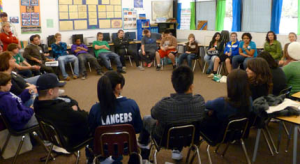 First, we should start with the original meaning of the word school which describes the place where the rules are suspended and no laws are imposed. This is not what most of students are experiencing about school. And it seems that often teachers have as a primary job of maintaining order. The power only belongs to the teachers, administrators… and students don’t feel heard or safe to express their point because they know that the answer will be punishments which are not effective ways of creating listening.
First, we should start with the original meaning of the word school which describes the place where the rules are suspended and no laws are imposed. This is not what most of students are experiencing about school. And it seems that often teachers have as a primary job of maintaining order. The power only belongs to the teachers, administrators… and students don’t feel heard or safe to express their point because they know that the answer will be punishments which are not effective ways of creating listening.
It’s empowering to have the power distributed. It will be important to stop trying to manage other people’s behavior. So students stop feeling apart or not engaged. But how can we respond to conflict without imposing rules. It’s the dialogue, not just as a conversation but as a real practice. Because it’s not about having different view of well-being, it’s just that people are not listening to each other. We all want to the same, to feel safe, loved and heard.
In order to respond to challenging, painful situation, conflict or violence, they created some restorative circles in schools. The aim is to create a welcoming environment, make this space safe and a moment of connection, a celebration of smile where teachers or administrators understand who the students are and not judging them based on what they did.
It’s about creating the conditions safer so students will feel heard in a way they would transform their behavior. So the most important pieces in the practice will be respect, responsibility but also value self-care. We have everything that we need inside ourselves and when the power and the ego become less an issue it’s easier to focus on what we really need to focus on.
We need to know how to be relational because we are relational being and we need to honor that. We want to make sure to connect with the humanity of other people otherwise we’ll always see them as others and not like the one we want to connect with. And in order to achieve this, dialogue must be the key.
Everyone who feels concerned by the youth can wonder how we can teach and practice the skills required so the peace becomes the norm in our schools.
Teaching Peace in schools can transform our world. There is so much encouraging work around the world but we need to carry on.
SOCIAL AND EMOTIONAL LEARNING
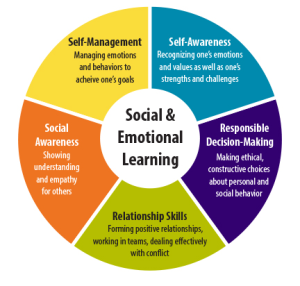 Social and emotional learning is the process which through children applies the knowledge, the attitude and skills necessary to understand, manage emotion, feel and show empathy for others. It’s also about establishing and maintaining positive relationships to make responsible decisions.
Social and emotional learning is the process which through children applies the knowledge, the attitude and skills necessary to understand, manage emotion, feel and show empathy for others. It’s also about establishing and maintaining positive relationships to make responsible decisions.
Learning is only effective in a supportive context to make learning meaningful. It really helps kids to have more understanding in their lives. A simple practice is the meditation which will reduce stress and increase the performance.
The key is also to make learning something challenging, engaging and meaningful. The goal is to help those kids to become caring parents, good employers or employees…
As we are living in a very competitive world, if the children can self-regulate, manage their own emotion, they will boost their academic performance. There would be less emotional stress, good social behavior and also less problems of drugs or alcohol.
If we want a compassionate and tolerant society, we need to teach these skills at school.
In each school where they experienced the social and emotional learning, data show that the climate in the class has changed. Less disturbing behavior, even teachers can feel there is a more peaceful environment and they also notice improvements in reading, math…
The key is also that everyone should use the same language even after school with the parents so it could become a way a being and how to be in the world. So it’s necessary to include the parents in the process as they are the role model.
Healthy food is also a key point which has to be part of the whole process. Children need to eat fresh food to increase their energy level.
Teach them how to eat, to relax, how to reduce their stress, increase their focus attention and awareness. They can become more and more aware, cultivate their own awareness and pay attention to what’s going on inside them.
It helps them to create this space between the stimulus and the reaction they are able to give. They can stay away from bad situations.
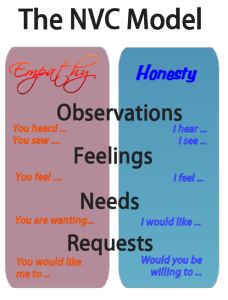 A radical quality of social change can be done within these following steps:
A radical quality of social change can be done within these following steps:
This process needs to be experienced and seen by teachers. They have to realize by themselves they can do differently and have to be inspired to do it. And only under those circumstances, they would be the agent of the change.
We need to help the teachers so they can support the next generation. It can put an end to the violence in our world and so everyone will finally see the humanity of each other rather than see the other as an enemy. Opening your heart and holding the intention to care for each other and we can make everyone’s life more beautiful.
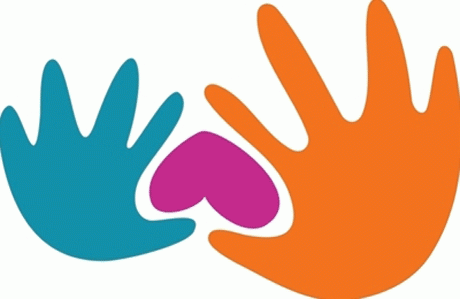
Author: Amelie Paterne
Editor: Ioana Frandes